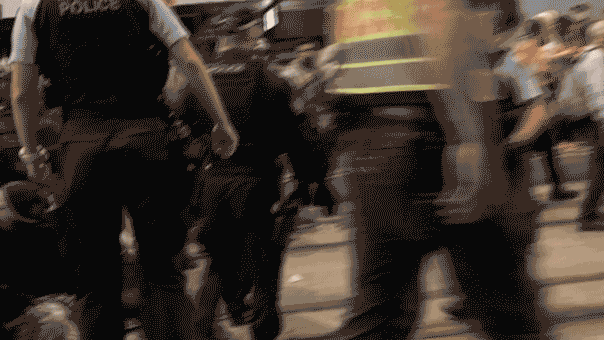Beirut – Syrian troops kept up attacks on the restive city of Hama Monday, the start of the Muslim holy month of Ramadan, a day after a brutal crackdown on anti-government protesters killed at least 70 and drew harsh rebukes from the U.S. and Europe.
Sunday was one of the bloodiest days since the uprising against President Bashar Assad's authoritarian rule began in mid-March. Six Syrian rights groups said in a joint statement that 74 people were killed throughout the country, 55 of them from Hama and neighboring villages.
The European Union was preparing new sanctions targeting Syria, the French Foreign Ministry spokeswoman said Monday.
"Residents are committed to resistance through peaceful means," Hama-based activist Omar Hamawi told The Associated Press by telephone Monday. The city's streets are full of barriers as well as thousands of men "who are ready to defend the city with stones," he said. "People will not surrender this time. We Will not allow a repetition of what happened in 1982," he said.
Hamawi said residents in villages and towns around Hama have blocked roads and highways leading to the city in order to prevent the military from bringing supplies. He added that dozens of checkpoints were set up and activists have blocked the highway linking the northern city of Aleppo, Syria's largest, with the capital Damascus.
The escalating government crackdown appears aimed at preventing the protests from swelling during Ramadan. Muslims throng mosques during Ramadan for special nighttime prayers after breaking their daily dawn-to-dusk fast. The gatherings could trigger intense protests throughout the predominantly Sunni country and activists say authorities are trying to prevent that.
The worst carnage on Sunday was in Hama, the scene of a 1982 massacre by Assad's late father and predecessor and a city with a history of defiance against 40 years of Assad family rule.
Hospitals there were overwhelmed with casualties, suggesting the death toll could rise sharply, witnesses said.
It appeared the regime was making an example of Hama, a religiously conservative city of about 800,000 people some 130 miles (210 kilometers) north of the capital, Damascus. The city largely has fallen out of government control since June as residents turned on the regime and blockaded the streets against encroaching tanks.
President Barack Obama on Sunday called the reports "horrifying" and said Assad is "completely incapable and unwilling" to respond to the legitimate grievances of the Syrian people. On Monday, Britain's foreign secretary William Hague said there is no prospect of international military intervention in Syria, despite an assault by the regime on protest strongholds.
Troops backed by tanks renewed shelling of Hama for a second day in an attempt to subdue the city.
Hama resident Saleh Abu Yaman said there was heavy shooting in the northeastern Hamidiyeh neighborhood -- which he described as a hotbed of anti-regime activists. Rami Abdul-Rahman, the head of the London-based Syrian Observatory for Human Rights, said troops raided Hamidiyeh and killed at least two people and wounded 10. He cited hospital officials in the city.
Hamawi said tanks resumed fire on Hamidiyeh Monday morning after a night of sporadic shooting. Syria-based rights activist Mustafa Osso confirmed Hama was being shelled.
More than 1,600 civilians have been killed in the crackdown on the largely peaceful protests against Assad's regime since the uprising began in mid-March. But the regime disputes the toll and blames a foreign conspiracy for the unrest, saying religious extremists -- not true reform-seekers -- are behind it.
The military assault on Sunday and Monday also targeted the eastern city of Deir el-Zour. Abdul-Rahman said there was intense shooting in the city overnight.
He said troops backed by tanks also entered the town of Houla in central province of Homs on Monday.
Assad said in remarks published Monday that he remains confident his government will quell the uprising, which he said is aimed at "fragmenting the country as a prelude for fragmenting the entire region." The comments were published in the army's As-Shaab magazine.
Hama has a history of defiance.
In 1982, Assad's father, Hafez Assad, ordered the military to quell a rebellion by Syrian members of the conservative Muslim Brotherhood movement. The city was sealed off and bombs dropped from above smashed swaths of the city and killed between 10,000 and 25,000 people, rights groups say.
The real number may never be known. Then, as now, reporters were not allowed to reach the area.
The head of the political department of the Syrian army, Lt. Gen. Riad Haddad, said in remarks published Monday that Syria is facing the "closing chapter of the conspiracy."
Haddad called the army's intervention in some Syrian cities an "indispensable necessity" to defend and protect the country's security and stability, and to put an end to armed groups that attack people, smash public and private properties and disrupt public life.








































